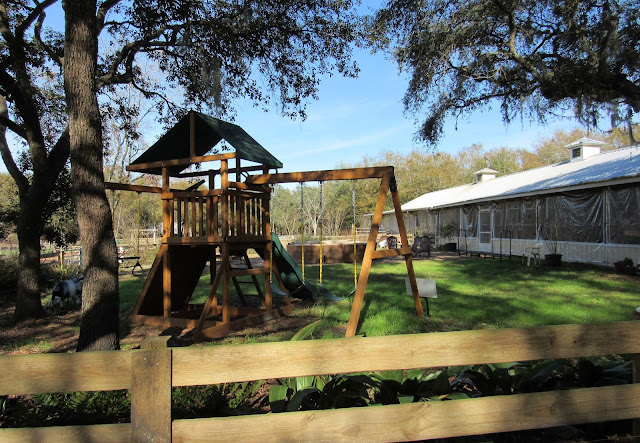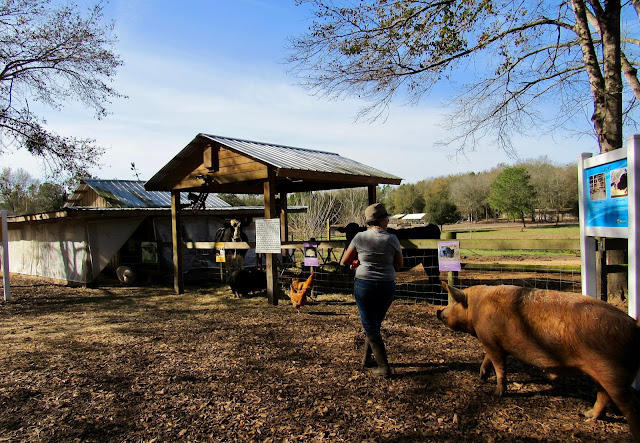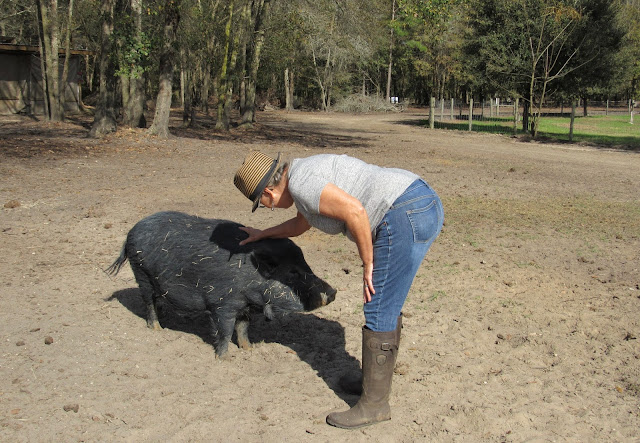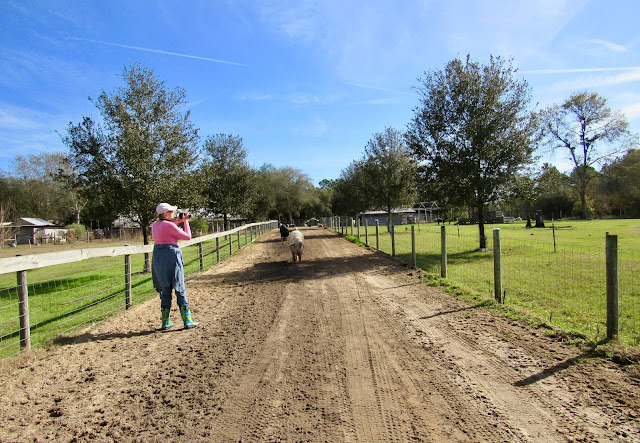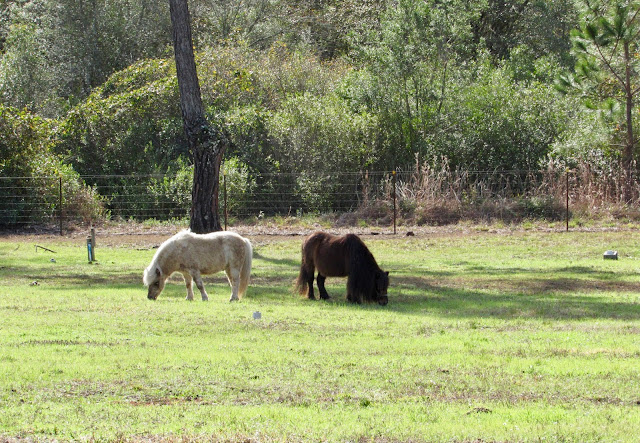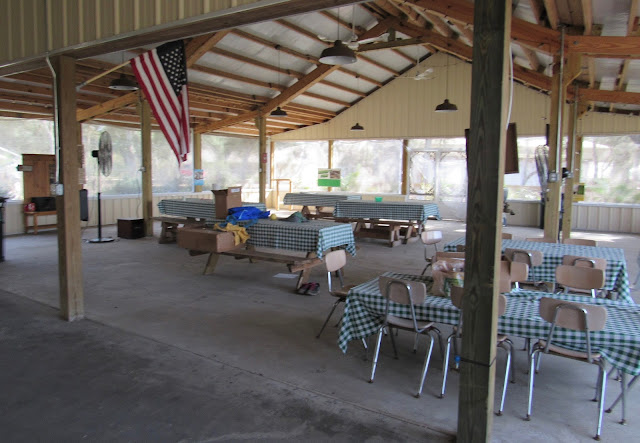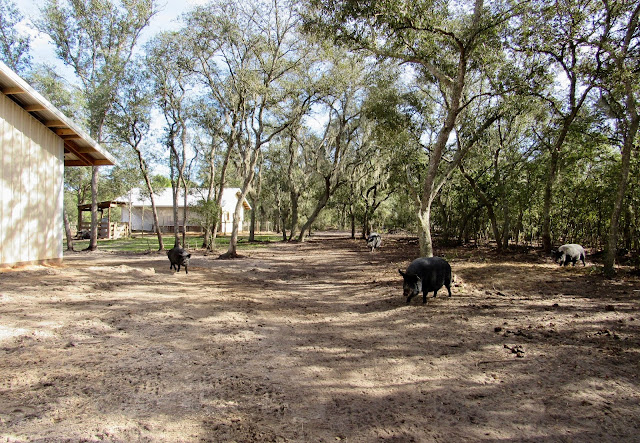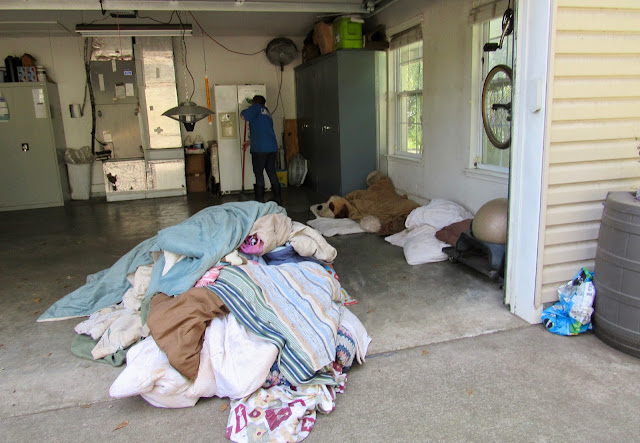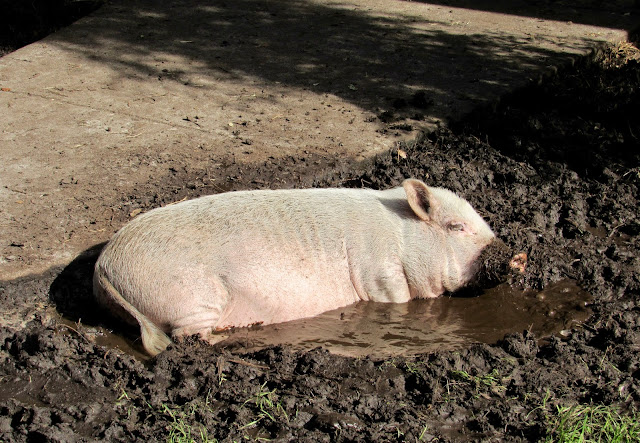Just outside the little town of Melrose, Florida is a unique place called Rooterville. It's a little out of the way, and for good reason. The picture of the road is blurry, because the road is bumpy.
Rooterville is a pig rescue/sanctuary primarily, but it is home to over 300 rescued animals. The effort began when founder, Elaine West, began rescuing and rehoming pot bellied pigs.
We came with Tina's friend, Leslie, who lives in Melrose and is a volunteer at Rooterville. When we arrive, a welcoming committee comes to greet us. There are at least 3 Great Pyrenees mountain dogs that live on the property. This one is performing greeting duties today.
The first thing to do is don a pair of barn boots that can be easily hosed off. They don't have to be as fancy as Tina's.
One of the free-range pigs comes to check out Tina. The animals here each came from situations of abuse, abandonment, or neglect.
Leslie knows them all by name, and it is plain to see they love her. This little piggy wanted a belly rub.
Leslie's here! This pig comes out from one of many shelters around the property.
Snack time! Leslie and another volunteer bring out small watermelons and smash them on the ground as the piggies come running. Many of these pigs were former pets. These "Teacup Pigs" quickly outgrew that description and were no longer wanted.
Unwanted pet pigs are being abandoned or even sold to be eaten. Most Humane Societies and shelters will not take pigs.
Pigs on tour: The free range pigs follow us as Leslie shows us around.
Some pigs are in an enclosed shelter or fenced area for various reasons, such as medical, age, or temperament. The plastic protects the pigs from cold weather, while fans are run for them in hot weather.
Many of the pigs given a second chance here have been rescued from factory farms where they lived under horrific conditions and narrowly escaped slaughter.
Leslie is like a Pied Piper.
Pigs raised on factory farms spend their lives in small cages where they stand in their own waste and are forced to produce piglets which are taken from them before they are two weeks old. Stella was the first factory farm pig that came to Rooterville and became their inspiration.
Rescued pigs spend their remaining days receiving great care and love at Rooterville.
Pigs are lovingly cared for mostly by volunteers like Leslie. Their habitats are kept clean and they are well fed.
It does not smell like a pig farm here. In fact weddings are sometimes held here.
Pigs are not the only rescued animals that live here. We are on the way to visit some dairy cows.
Tinsel and Holly were slated for auction at only a few days old. They were left for dead when they were deemed too weak to sell. At Rooterville, these two cows enjoy a special pasture.
Pigs are allowed to sing all they want at Rooterville.
How can you resist that face?
They all like attention.
And back scratches.
Reading about the living conditions and treatment of animals raised for meat, makes a plant-based diet all the more appealing.
Next time you buy a Butterball turkey, remember this:
There is just one of these rescued Butterball turkeys still living happily at Rooterville.
There are also rescued chickens at Rooterville. Here is their story:
On the roof of the chicken coop...
Chickens and roosters are allowed to roam all over the farm during the day.
This rooster is showing us some turkeys.
These turkeys spend the night in here for protection. They will be let outside soon.
Even the chickens have names, but I don't remember them.
This one was named "Fluffy Feet" or something like that.
More rescued fowl...
I don't remember the total number of acres here, but it is a large piece of property.
We are on our way to meet a special pair.
In there...
It looks like just ordinary pigs resting in the hay.
But these two rescues have become a bonded pair.
Every morning this dog is let out of its kennel and he comes straight here and spends his day with his best friend.
There are multiple wallowing holes around the farm.
Now there's a contented pig.
Notice the bristle brush placed strategically on the tree to provide back scratches.
The feeding chute. Volunteers ring the dinner bell and the pigs come here to be fed. Then the chutes are hosed down and cleaned. They are very well organized here. There are several of these feeding areas on the farm.
Two rescued miniature horses share a pasture with some goats.
They all know when Leslie is coming!
Hay is available any time of day.
Water pumps provide on-demand water to the animals all over the farm.
Getting a drink.
Nobody gets in trouble for eating the flowers here.
Pigs have the right of way.
This large building is used by groups and rented at times for special events.
Another rescue story.
This special area is habitat for geriatric pigs.
Leslie greets another friend.
Sometimes there is a little jealousy.
One of many barns/shelters on the farm.
They all seem to like Tina's boots.
Leslie calls them and they come from all directions.
She greets them with open arms.
And gives them individual attention.
A volunteer is cleaning out a feeding chute.
Here comes Max from the farm house.
The dogs love attention too.
A place to sit.
The open garage is another place the pigs can take shelter on donated blankets and pillows.
Jack was asleep, but he woke up when we arrived.
Piggy asleep on a dog bed on the porch.
Max and Jack, if I remember their names correctly.
This special pig was born without shoulder joints, which was only discovered as she started to grow too big for her to support her weight.
A veterinarian performed surgery to give her an artificial joint so she can walk.
Look at her fancy enclosure/shelter. The sanctuary always accepts donated items like these blankets an quilts.
She has her own personal wallowing hole outside the farmhouse.
Wallowing in mud not only keeps the pigs cool, but also helps protect against sunburn.
After greeting us, Jack went back to sleep.
The second chances all these animals are given are made possible by generous people who care enough to give of their money and time.
Please consider supporting the wonderful work that is done at Rooterville: www.rooterville.org
















